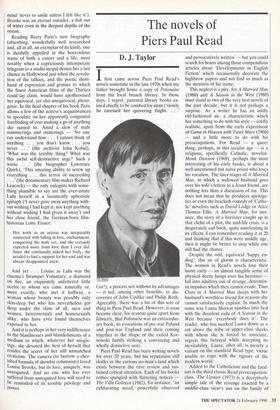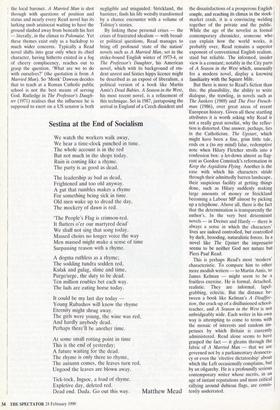The novels of Piers Paul Read
D. J. Taylor
Ifirst came across Piers Paul Read's novels sometime in the late 1970s when my father brought home a copy of Polonaise from the local branch library. In those days, I regret, parental library books ex- isted chiefly to be combed for smut ('slowly he caressed her quivering thighs. . . .'
Corp; a process not without its advantages — it led, among other benefits, to dis- coveries of John Updike and Philip Roth. Agreeably, there was a lot of this sort of thing in Piers Paul Read. However, it soon became clear, for reasons quite apart from lubricity, that Polonaise was an extraordin- ary book, its evocations of pre-war Poland and post-war England and their coming together in the shape of the exiled Kor- nowski family striking a convincing and wholly distinctive note.
Piers Paul Read has been writing novels for over 20 years, but his reputation still skulks in the curious no-man's-land which exists between the rave review and sus- tained critical attention. Each of his books comes spangled with flattering notices — The Villa Golitsyn (1982), for instance, 'an exhilarating novel, powerfully observed
and provocatively written' — but you could search for hours among those compendious articles about 'Developments in English Fiction' which occasionally decorate the highbrow papers and not find so much as the mention of his name.
This neglect is a pity, for A Married Man (1980) and A Season in the West (1988) must stand as two of the very best novels of the past decade, but it is not perhaps a surprise. As a writer he has an oddly old-fashioned air, a characteristic which has something to do with his style — coldly realistic, apart from the early experiment of Game in Heaven with Tussy Marx (1966) — and a little more to do with his preoccupations. For Read — a queer thing, perhaps, in this secular age — is a religious, specifically Catholic, novelist. Monk Dawson (1969), perhaps the most interesting of his early books, is about a well-intentioned but naïve priest who loses his vocation. The later stages of A Married Man, in which a widowed husband goes over his wife's letters to a Jesuit friend, are nothing less than a discussion of sin. This does not mean that he produces apologe- tics or even the brackish comedy of 'Catho- lic' novelists such as David Lodge or Alice Thomas Ellis. A Married Man, for inst- ance, the story of a barrister caught up in that cliché of a plot, the mid-life crisis, is a desperately sad book, quite unrelenting in its effects. I can remember reading it at 20 and thinking that if this were middle age, then it might be better to stop while one still had the chance.
Despite the odd, equivocal 'happy en- ding', this air of gloom is characteristic. The women in Read's novels lose their lustre early — an almost tangible sense of physical decay hangs over his heroines — fall into adultery out of strange, determin- ist impulses which they cannot evade. Thus Clare in A Married Man sleeps with her husband's worthless friend for reasons she cannot satisfactorily explain. In much the same way Laura Morton tumbles into bed with the dissident exile of A Season in the West because 'everybody does it'. The reader, who has marked Laura down as a cut above the tribe of upper-class sharks with whom she is forced to associate, regrets this betrayal while accepting its inevitability. Laura, after all, is merely a variant on the standard Read type: virtue unable to cope with the rigours of the modern world.
Added to the Catholicism and the fatal- ism is the third classic Read preoccupation: class. The Upstart (1973) is a deceptively simple tale of the revenge exacted by a middle-class vicar's son on the family of the local baronet. A Married Man is shot through with questions of position and status and nearly every Read novel has its lurking snob aristocrat waiting to have the ground slashed away from beneath his feet — literally, in the climax to Polonaise. Yet these themes exist only as a backdrop to much wider concerns. Typically a Read novel shifts into gear only when its chief character, having hitherto existed in a fog of cheery complacency, reaches out to grasp the question, 'What are we to do with ourselves?' (the quotation is from A Married Man). So 'Monk' Dawson decides that to teach at a Roman Catholic public school is not the best means of serving God. Rutledge in The Professor's Daugh- ter (1971) realises that the influence he is supposed to exert on a US senator is both
negligible and misguided. Strickland, the barrister, finds his life weirdly transformed by a chance encounter with a volume of Tolstoy's stories.
By linking these personal crises — the crises of frustrated idealism — with broad- er political questions, Read manages to bring off profound 'state of the nation' novels such as A Married Man, set in the strike-bound English winter of 1973-4, or The Professor's Daughter, his American novel, which with its background of stu- dent unrest and Sixties hippy licence might be described as an exposé of liberalism, a political version of a book like Martin Amis's Dead Babies. A Season in the West, his most recent novel, is a refinement of this technique. Set in 1987, juxtaposing the arrival in England of a Czech dissident and the dissatisfactions of a prosperous English couple, and reaching its climax in the stock- market crash, it is a convincing welding together of the private and the public. While the age of the novelist as formal contemporary chronicler, someone who can explain how the world works, is probably over, Read remains a superior exponent of conventional English realism, staid but reliable. The informed, insider view is a constant; notably in the City parts of A Season in the West which, unusually for a modern novel, display a knowing familiarity with the Square Mile.
But there is more to Read's fiction than this: the plausibility, the ability to write dialogue, the trawling, in novels such as The Junkers (1969) and The Free French- man (1986), over great areas of recent European history. Given all these startling attributes it is worth asking why Read is not a really great novelist, why the reflec- tion is distorted. One answer, perhaps, lies in the Catholicism. The Upstart, which might have been a fine, grim little tale, ends on a (to my mind) false, redemptive note when Hilary Fletcher strolls into a confession box: a let-down almost as flag- rant as Gordon Comstock's reformation in Keep the Aspidistra Flying. Another is the ease with which his characters stride through their admittedly barren landscape, their suspicious facility at getting things done, such as Hilary suddenly making large amounts of money or Strickland becoming a Labour MP almost by picking up a telephone. Above all, there is the fact that the determination is transparently the author's. In the very best determinist novels —in Dreiser and Hardy — there is always a sense in which the characters' lives are indeed controlled, but controlled by dark, brooding, naturalistic forces. In a novel like The Upstart the impresario seems to be neither God nor nature but Piers Paul Read.
This is perhaps Read's most 'modern' characteristic. To compare him to other more modish writers — to Martin Amis, to James Kelman — might seem to be a fruitless exercise. He is formal, detached, realistic, They are informal, lapel- grabbing, eclectic. But the distance be- tween a book like Kelman's A Disaffec- tion, the crack-up of a disillusioned school- teacher, and A Season in the West is not unbridgeably wide. Each writer in his own way is attempting to come to terms with the mosaic of interests and random im- petuses by which Britain is currently administered. Read alone seems to have grasped the fact — it gleams through the fabric of A Married Man — that we are governed not by a parliamentary democra- cy or even the 'elective dictatorship' about which the Left occasionally complains, but by an oligarchy. He is a profoundly serious contemporary writer whose merits, in an age of instant reputations and mass critical rallying around dubious flags, are consis- tently underrated.



















































 Previous page
Previous page